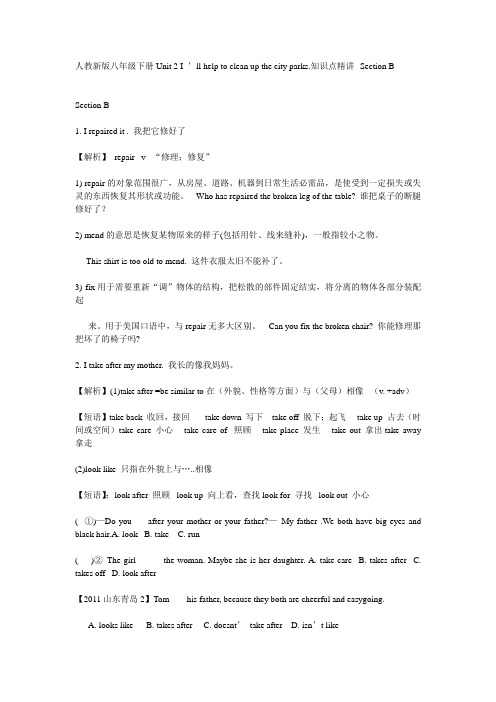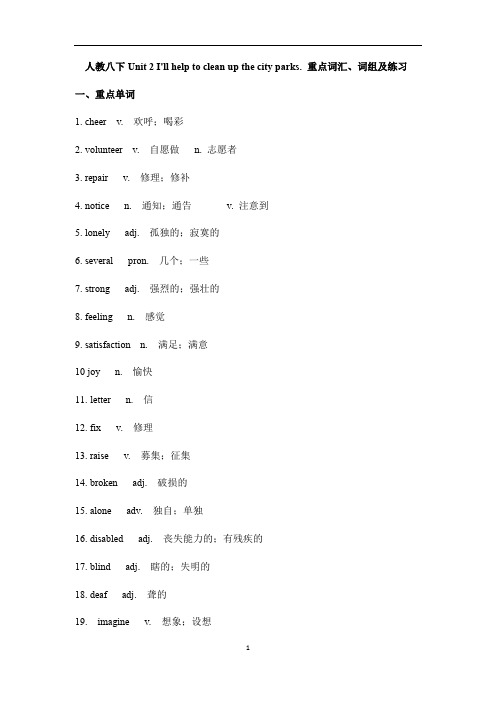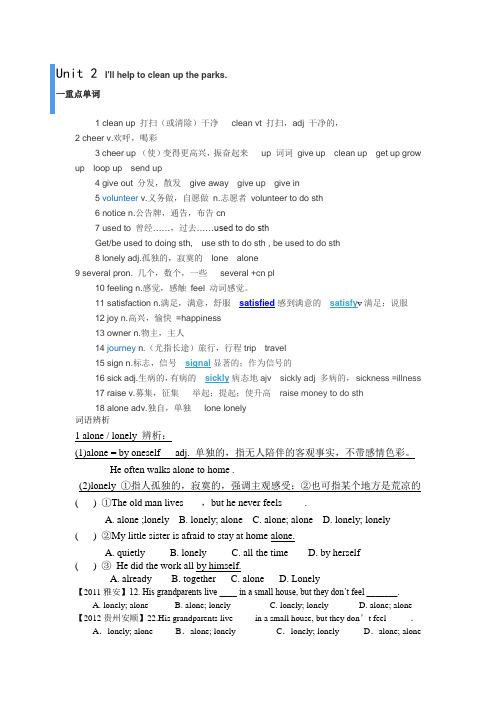八年级英语下册 Unit 2 I’ll help clean up the city park Section B 2课件 (新版)人教新目标版
人教新版八年级下册Unit2I’llhelptocleanupthecityparks.知识点精讲--SectionB

人教新版八年级下册Unit 2 I ’ll help to clean up the city parks.知识点精讲--Section B Section B1. I repaired it . 我把它修好了【解析】repair v “修理;修复”1) repair的对象范围很广,从房屋、道路、机器到日常生活必需品,是使受到一定损失或失灵的东西恢复其形状或功能。
Who has repaired the broken leg of the table? 谁把桌子的断腿修好了?2) mend的意思是恢复某物原来的样子(包括用针、线来缝补),一般指较小之物。
This shirt is too old to mend. 这件衣服太旧不能补了。
3) fix用于需要重新“调”物体的结构,把松散的部件固定结实,将分离的物体各部分装配起来。
用于美国口语中,与repair无多大区别。
Can you fix the broken chair? 你能修理那把坏了的椅子吗?2. I take after my mother. 我长的像我妈妈。
【解析】(1)take after =be similar to在(外貌、性格等方面)与(父母)相像(v. +adv)【短语】take back 收回,接回take down 写下take off 脱下;起飞take up 占去(时间或空间)take care 小心take care of 照顾 take place 发生take out 拿出take away 拿走(2)look like 只指在外貌上与…..相像【短语】:look after 照顾look up 向上看,查找look for 寻找look out 小心( ①)—Do you ___after your mother or your father?—My father .We both have big eyes and black hair.A. look B. take C. run( )②The girl _____ the woman. Maybe she is her daughter. A. take care B. takes after C. takes off D. look after【2011山东青岛2】Tom ___ his father, because they both are cheerful and easygoing.A. looks likeB. takes afterC. doesnt’take afterD. isn’t like3. I fixed it up. 我把它修理好了。
人教版英语初二下册 Unit 2 I`ll help to clean up the city park 知识讲解

Unit 2 I’ll help to clean up the city parks.词句精讲精练词汇精讲1. clean upclean up意为“打扫”,up为副词,此短语是动副型短语,如果宾语为代词,应放在短语中间;如果宾语是名词,可放于短语之间或两词之后。
例如:Please clean up this street at once. 请马上把这条街打扫干净。
This street is dirty. Please clean it up. 这条街道太脏了,请把它打扫干净。
2. cheer upcheer up意为“变得高兴,振奋起来”,是“动词+副词”结构的短语。
cheer up既可作及物动词短语,也可作不及物动词短语。
例如:He cheered up at once when I agreed to help him. 我同意帮助他时,他马上高兴起来。
Cheer up! The news isn’t too bad. 振作起来!这消息不是太坏。
He took her to the cinema to cheer her up. 为了让她高兴,他带她去了电影院。
【拓展】(1) cheer作不及物动词,意为“欢呼;喝彩”。
例如:The girls cheered as the famous singer arrived. 当这位著名的歌手到达时,女孩子们大声欢呼。
(2) cheer作及物动词,意为“为……欢呼,高呼”。
例如:The whole village turned out to cheer the hero. 全村人都出来向那位英雄欢呼。
(3) cheer作可数名词,意为“欢呼声;喝彩声”。
例如:We can hear the cheers of students outside the gym. 我们在体育场外就能听到学生的欢呼声。
(4) cheer on意为“为……加油”。
例如:We will have a basketball game this afternoon. Would you like to come and cheer us on?我们今天下午有一场篮球比赛,你愿意来为我们加油吗?3. give outgive out意为“散发;分发”,相当于hand out,是“动词+ 副词”结构的短语动词。
完整版)人教版八年级英语下册第二单元知识点归纳总结

完整版)人教版八年级英语下册第二单元知识点归纳总结Unit 2: I'll Help Clean Up the City ParksIn our community。
we have many beautiful parks that we can enjoy。
However。
sometimes people leave trash and litter behind。
which can make the parks look messy and uninviting。
That's why I'm excited to help clean up the city parks with my friends。
We plan to set up a le and make a plan to clean up different parks each week。
We'll gather our XXX each other up as we work to make a difference in our community。
We'll also give out flyers and talk to people in the community to encourage them to help keep the parks clean。
We believe that if we all work together。
we can make it possible for everyone to enjoy the parks in a clean and safe environment。
I used to think that one person couldn't make a difference。
but I've XXX caring for our community。
人教版八年级英语下册Unit 2 I'll help to clean up the cit

Unit2:I’ll help to clean up the city park.Section A:知识点一:clean up的用法:打扫干净如果宾语是名词:可放在之间或者末尾是代词:只能在之间。
例题:On Earth Day, many people in our city go to People’s Park to .A.Clean up itB.clean them upC.clean it upD.clean it up知识点二:cheer up使变得高兴;振奋起来如果宾语是名词:可放在之间或者末尾是代词:只能在之间。
例题:John isn’t happy today.Let’s go and .Good idea.A.cheer him upB.cheer up himC.to cheer up知识点三:give out散发,分发如果宾语是名词:可放在之间或者末尾是代词:只能在之间。
give的其他短语Give away 赠送give up 放弃give back 归还give off 发出放出Give sb sth给某人某物give in屈服例题:Could you please teach me how to red envelopes on WeChat? Sure. Let me show you.A.give outB.give backC.give way知识点四:put offput off意为“推迟”。
The concert was put off because of the heavy rain.演唱会因为大雨而被推迟了。
拓展:常见的put短语有:put off推迟;延迟穿上;put on展出;上演戴上put away收起来put out熄灭;扑灭put up with容忍put up搭建;建造张贴提升例4They the date of the meeting because of the bad weather.A.put offB.gave awayC.put onD.turn down知识点五used to的用法used to表示“过去常常;以前经常”,后跟动词原形,用来描述过去经常发生的动作或存在的状态。
初中英语 人教八下Unit 2 I'll help to clean up the city parks. 重点词汇、词组复习及练习

人教八下Unit 2 I'll help to clean up the city parks. 重点词汇、词组及练习一、重点单词1. cheer v. 欢呼;喝彩2. volunteer v. 自愿做n. 志愿者3. repair v. 修理;修补4. notice n. 通知;通告v. 注意到5. lonely adj. 孤独的;寂寞的6. several pron. 几个;一些7. strong adj. 强烈的;强壮的8. feeling n. 感觉9. satisfaction n. 满足;满意10 joy n. 愉快11.letter n. 信12. fix v. 修理13. raise v. 募集;征集14. broken adj. 破损的15. alone adv. 独自;单独16. disabled adj. 丧失能力的;有残疾的17. blind adj. 瞎的;失明的18. deaf adj. 聋的19. imagine v. 想象;设想20. difficulty n. 困难;难题21. interest n. 兴趣v. 使感兴趣22. open v. 开;打开23. door n. 门24. carry v. 拿;提25. train v. 训练;培训training n. 训练;培训26. excited adj. 激动的;兴奋的27. change v.& n. 变化;改变28. kindness n. 仁慈;善良29. clever adj. 聪明的;聪颖的30. understand v. 理解;领会二、重点短语1. clean up 打扫干净2. cheer up 振奋起来3. give out 分发;散发4. come up with 想出;提出5. put off 推迟6. hand out 分发7. give away 赠送;捐赠8. take after (外貌或行为)像9. set up 建起;设立10. try out 参加……选拔;试用13. help out with sth. 帮助解决困难15. at the age of 在……岁时16. make a plan 制订计划18. work for 为……工作;为……效力19. put up 建造;举起;张贴20. for example 比如;例如21. raise money 筹钱;募捐22. at least 至少23. come true 实现24. at the same time 同时25. be worried about 担心26. in one’s free time 在某人的业余时间27. make a difference 影响;有作用28. be similar to 与……相似29. give sb. orders 给某人下命令30. the idea of doing sth. 做某事的想法三、词性转换1. raise v. 筹集—raised(过去式) —raising(现在分词)2. understand v. 理解—understood(过去式)3. feel v. 感觉—felt(过去式)4. fix v.修理—fixed(过去式) —fixing(现在分词)5. take v. 拿—took(过去式)6. break v. 破损—broke(过去式) —broken(过去分词)7. make v.制作—made(过去式)8. difficult adj. 困难的—difficulty(名词)9. own v. 拥有—owner(名词)10. kind adj. 善良的—kindness(名词)四、巩固练习A. 根据句意、首字母或汉语提示完成单词。
新目标英语8年级下二单元 I'll help to clean up the park语法详解

Unit 2I'll help to clean up the parks.一重点单词1 clean up 打扫(或清除)干净clean vt 打扫,adj 干净的,2 cheer v.欢呼,喝彩3 cheer up (使)变得更高兴,振奋起来up 词词give up clean up get up growup loop up send up4 give out 分发,散发give away give up give in5 volunteer v.义务做,自愿做n.志愿者volunteer to do sth6 notice n.公告牌,通告,布告cn7 used to 曾经……,过去……used to do sthGet/be used to doing sth, use sth to do sth , be used to do sth8 lonely adj.孤独的,寂寞的lone alone9 several pron. 几个,数个,一些several +cn pl10 feeling n.感觉,感触feel 动词感觉。
11 satisfaction n.满足,满意,舒服satisfied感到满意的satisfy v满足;说服12 joy n.高兴,愉快=happiness13 owner n.物主,主人14 journey n.(尤指长途)旅行,行程trip travel15 sign n.标志,信号signal 显著的;作为信号的16 sick adj.生病的,有病的sickly 病态地ajv sickly adj 多病的,sickness =illness17 raise v.募集,征集举起;提起;使升高raise money to do sth18 alone adv.独自,单独lone lonely词语辨析1 alone / lonely 辨析:(1)alone = by oneself adj. 单独的,指无人陪伴的客观事实,不带感情色彩。
八年级下册第二单元知识点梳理

八年级下册第二单元知识点梳理初中英语PEP人教版知识归纳Unit2I’ll help to clean up the city parks.【重点单词】clean up 打扫(清除)干净cheer [tʃiə] v. 欢呼cheer up 变得更高兴,振奋起来give out 分发,散发volunteer [ˌvɔlənˈtiə] n. & v. 志愿者;义务做come up with 想出,提出put off 推迟sign [saɪn] n. 标记,符号,标牌notice [ˈnəʊtɪs] n. & v. 通知,公告;注意到hand out 分发call up 打电话给…某人,征召used to do sth. 过去常常做某事lonely ['ləʊnlɪ] adj. 孤独的,寂寞的care for 照顾,非常喜欢several [ˈsevrəl] prep. 几个,数个,一些strong [strɒŋ] adj. 强壮的,强烈的feeling [ˈfi:lɪŋ] n. 感觉,感触satisfaction [ˌsætɪs'fækʃn] n. 满足,满意joy [dʒɔɪ] n. 高兴,愉快owner [ˈəʊnə(r)] n. 所有者,物主try out 参加…选拔,试用journey ['dʒɜ:nɪ] n. (尤指长途)旅行,行程raise [reɪz] v. 抬起,举起,筹集,征集alone [əˈləun] adv. 独自地,孤独地repair [riˈpɛə] v. 修理,修补fix [fiks] v. 修理,安装fix up 修理,修补give away 赠送,捐赠take after (外貌或行为)像broken ['brəʊkən] adj. 破损的,残缺的wheel [wi:l] n. & v. 轮子,车轮;旋转letter [ˈletə] n. 信件,字母Miss [mɪs] n. 小姐set up 建立,设立disabled [disˈeibəld] adj. 有残疾的,丧失能力的make a difference 影响,有作用blind [blaɪnd] adj. 盲的,盲目的,失明的deaf [def] adj. 聋的imagine [ɪˈmædʒɪn] v. 想象,设想difficulty ['dɪfɪkəltɪ] n. 困难open [ˈəʊpən] v. 打开door [dɔ:] n. 门carry ['kærɪ] v. 携带,搬运train [treɪn] v. 训练,培养training [ˈtreɪnɪŋ] n. 训练,培训excited [ɪkˈsaɪtɪd] adj. 激动的,兴奋的kindness [ˈkaɪndnəs] n. 仁慈,善良,亲切,善意clever [ˈklevə] adj. 聪明的,机灵的understand [ˌʌndəˈstænd] v. 懂,理解change [tʃeɪndʒ] n. & v. 改变interest ['ɪntrəst] n. & v. 感兴趣;兴趣sir [sɜ:(r)] n. 先生madam ['mædəm] n. 夫人,女士【重点短语】1.Clean-Up Day 清洁日2. an old people’s home 养老院3. help out with sth.帮助解决困难4. used to过去常常......5. care for 关心;照顾6. the look of joy 快乐的表情7. at the age of 在......岁时8.clean up 打扫(或清除)干净9. cheer up (使)变得更高兴;振奋10. give out 分发;散发11. come up with 想出;提出12. make a plan 制订计划13. make some notices 做些公告牌14. try out 试用;试行15. work for 为…工作;为…. 效力16. put up 建造;举起;张贴17. hand out 分发;散发;发给18. call up 打电话;召集19. put off 推迟;延迟20. for example 比如;例如21. raise money 筹钱;募捐22. take after 与......相像;像23. give away 赠送;捐赠24. fix up 修理;修补;解决25. be similar to 与……相似26. set up 建立;设立27. disabled people 残疾人28. make a difference 影响;有作用29. be able to 能够30. after-school reading program 课外阅读项目【重点句型】1. The boy could give out food at the food bank. 这个男孩可以在食品救济站分发食物。
八年级英语下册unit2 I'll help...section B 知识点。

(2) Help sb out帮组某人摆脱困境;帮组某人解决 困难。 Help them out as possible as you can. 尽可能的帮组他们摆脱困境。 I can’t work out this math problem, please help me out.我做不出这道数学题,请帮我解决。 8.She talked to Animal Helpers about getting me a special trained dog.她与动物帮手组织联系, 试图给我找一只经过特殊训练的狗。 train的用法: (1)vt.训练;培养。 train sb (sth) to do sth.训练某人(某事)去做某 事。 train sb in sth在某方面训练/培养人。
4.Who wrote the letter to Miss Li?谁给李小姐写信? (1)letter.可数名词“信;函”。Tom, here is a letter for you.汤姆,这儿有你的一封信。 (2)Write the letter to sb=write to sb.给某人写信。 I’m writing the letter to my friend. 我正在给我朋友写信。 Do you often write to your friends? 你经常给朋友写信吗? (3)Receive a letter from sb=hear from sb收到某人 的来信。 I often hear from my friends.我经常收到朋友的来 信。
trained是过去分词作定语。 She is a trained nurse.她是一个训练过的护士。 9.You see, I’m only able to have a “dog-helper” of your kindness.你看,正因为你的仁慈,我才能 有一只导盲犬。 Kindness不可数名词,意为“仁慈;善良”。 I’ll never forget your kindness. 我将永远不会忘记你的好意。 I can’t thank you enough for your kindness. 对你的好意我感激不尽。 类似的由“形容词+ness”构成的名词还有: good-goodness(善良)happy-happiness (幸福) ill-illness(疾病) sad-sadness(悲伤)。
- 1、下载文档前请自行甄别文档内容的完整性,平台不提供额外的编辑、内容补充、找答案等附加服务。
- 2、"仅部分预览"的文档,不可在线预览部分如存在完整性等问题,可反馈申请退款(可完整预览的文档不适用该条件!)。
- 3、如文档侵犯您的权益,请联系客服反馈,我们会尽快为您处理(人工客服工作时间:9:00-18:30)。
4. 作后置定语。
e.g. Claire missed a great chance to
make a lot of money.
克莱尔错过了一个赚大钱的机会。
5. 动词help及一些役使动词后面常省 略to。 e.g. My mother wouldn’t let me go to the movie.
妈妈不会让我去看电影的。
Ⅰ. Fill in the blanks. 1. He made me ____ tell (tell) him all the things.
2. Please remember _______ to water (water)
the plants while I’m away.
2. 作宾语补足语。常见动词有 ask, want, tell, invite, like, hate.
e.g. Mr. Li asked the students to copy
the text.
李老师让学生们抄写课文。
3. 作目的状语。
e.g. Jack turned his head around to look at people. 杰克转过头看向人群。
Ⅱ. Complete the sentences.
1. Who will _______________ volunteer to read (自愿读)
these words for us?
2. The girl often _____ helps her mother ____ do
the dishes (帮妈妈洗餐具) on
Complete the sentences. give ___ up several hours Mario and Mary ____ help others. Mario wants each week to __ ____
__ ___ to be an animal doctor. He _________ volunteers
3. Let’s ______ watch (watch) a talk show.
4. What can you expect _______ to learn (learn)
from the news?
5. My parents want me _____ to be (be) a doctor. 6. I’d like ________ to watch (watch) cartoons at home.
3. 她自愿一周去那里一次帮助孩子们 学习读书。 She _________ to volunteers there once a week ___ ____ help kids learn to read. 4. 她决定参加一个志愿者课后阅读节目 的选拔。
She _______ decided ___ to try out for a volunteer
at an animal hospital. He wants __ to _____ learn
more about ____ how __ to care for animals. Can you tell something about Mario to us?
Mary is a book lover. She could read by herself __ at ___ the ____ age of four. Last year, she decided __ ___ for a volunteer afterto ___ try out school _______ reading program. Mary still works there once a week __ ____ kids to help _____ learn __ to read. Volunteering here is a dream come true for her. She can what she _____ helps others at the loves ___ to ___and do same time. Can you tell something about Mary to us?
weekends.
3. We ______ asked her ________ to come (邀请 来) to our party. 4. The old man had ____________ nothing to do (无事可做) every day.
sick adj.
生病的;有病的; e.g. He felt sick before the test. 考试前他生病了。
after-school reading program.
5. 马里奥相信这会帮助他获得他的梦
想工作。 Mario believes it can help him ___ to ___ get his future dream job. 6. 我正在制作一些告示,并将它们张 贴于学校里。 I’m making some signs __ to ___ put __ up
around the school.
动词不定式 用法小结
1. 做动词宾语。常见动词有would
like, want, help, learn, hope,
decide, volunteer. e.g. We don’t want to spent too much money.
我们不想花费太多钱。
Fill in the blanks according to the text. 1. 我想去帮助无家可归的人。 I’d ____ like __ to ____ help homeless people. 2. 你可以请求医院允许你探访儿童并让他 们变得更高兴。 You could ___ ask hospitals ___ to ___ let you visit the kids and cheer them up.
